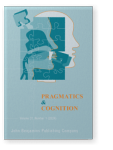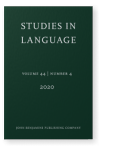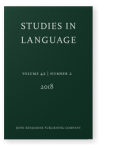Tohru Seraku
List of John Benjamins publications for which Tohru Seraku plays a role.
2024 Japanese unnun as a meta-discourse placeholder: Exploring its grammatical and functional properties Pragmatics & Cognition 31:1, pp. 156–184 | Article
Previous studies have described a range of placeholder (PH) items. A PH fills in the grammatical slot of a target that a speaker is unable or unwilling to produce. This paper argues that Japanese unnun, an expression wholly underdescribed in the literature, serves as a PH and that it may also be… read more
2022 Referring to arbitrary entities with placeholders Pragmatics 32:3, pp. 426–451 | Article
A speaker/writer uses a placeholder (PH) to fill in the syntactic slot of a target word when she has no immediate access to the word or prefers to avoid explicitly mentioning it for contextual reasons. In the present article, I point out a hitherto understudied usage of PHs: a speaker/writer who… read more
2021 Mi -nominalizations in Japanese Wakamono Kotoba ‘youth language’ Pragmatics 31:2, pp. 278–302 | Article
This article explores grammatical and functional properties of mi-nominalizations in Japanese Wakamono Kotoba ‘youth language.’ In the standard variety, the suffix -mi nominalizes an adjective stem: fuka-mi ‘deep-nmlz’ (= ‘profoundness’). This suffix is also used in youth language, but its… read more
2020 Grammatical nominalization in Yoron Ryukyuan Studies in Language 44:4, pp. 879–916 | Article
Despite extensive research on Ryukyuan languages, relatively few attempts have been made to describe Ryukyuan nominalization. This paper sets out the agenda for exploring Ryukyuan nominalization with special reference to Yoron Ryukyuan, which, we propose, has four nominalizers: -si, hutu, munu,… read more
2018 The affective construction in Yoron Ryukyuan Studies in Language 42:2, pp. 418–454 | Article
In Yoron Ryukyuan, passives are formed through the verbal suffix ‘-ari’. In this article, we observe that the suffix is used to form a construction distinguished from the standard passives in several respects: (i) attachment of ‘-ari’ to a wide range of predicates, (ii) ‘-ari’ obligatorily… read more




